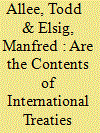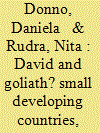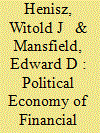|
|
|
Sort Order |
|
|
|
Items / Page
|
|
|
|
|
|
|
| Srl | Item |
| 1 |
ID:
168550


|
|
|
|
|
| Summary/Abstract |
Most accounts of international negotiations suggest that global agreements are individually crafted and distinct, while some emerging scholarship suggests a heavy reliance on models and templates. In this research, we present a comprehensive test of whether new international treaties are heavily copied and pasted from past ones. We specify several reasons to expect widespread copying and pasting, and argue that both the most and least powerful countries should be most likely to do so. Using text analysis to examine several hundred preferential trade agreements (PTAs), we reveal that most PTAs copy a sizable majority of their content word for word from an earlier agreement. At least one hundred PTAs take 80 percent or more of their contents directly from a single, existing treaty—with many copying and pasting 95 percent or more. These numbers climb even higher when we compare important substantive chapters of trade agreements, many of which are copied and pasted verbatim. Such copying and pasting is most prevalent among low-capacity governments that lean heavily on existing templates, and powerful states that desire to spread their preferred rules globally. This widespread replication of existing treaty language reshapes how we think about international cooperation, and it has important implications for literatures on institutional design, policy diffusion, state power, and legal fragmentation.
|
|
|
|
|
|
|
|
|
|
|
|
|
|
|
|
| 2 |
ID:
168552


|
|
|
|
|
| Summary/Abstract |
United Nations peacekeeping soldiers commit atrocities while deployed despite their mandate to protect civilians from harm. Yet, there is tremendous variation across missions in reported human rights abuses. Why are some missions more susceptible to misconduct than others? To answer this puzzle, we identify three broad sources of influence on peacekeeper behavior: institutions, society, and military culture. Using newly collected data, we find that host-country and contributing-country institutions, particularly press freedoms and rule of law, dramatically decrease violations. Compliance with international humanitarian law also decreases violations, though to a lesser degree than institutions. Societal influences, such as gender norms and income inequality, have virtually no impact on abuses. We illustrate the utility of these findings by generating out-of-sample predictions for hypothetical peacekeeping missions in countries with recent political turmoil.
|
|
|
|
|
|
|
|
|
|
|
|
|
|
|
|
| 3 |
ID:
168561


|
|
|
|
|
| Summary/Abstract |
Since the 1950s, US military personnel have taken on an increasingly diverse set of responsibilities, including less traditional roles delivering disaster aid and engaging in public diplomacy. Focusing on a particular subset of deployments, humanitarian and civic-assistance deployments to Latin America, we examine the effect that a US military presence can have on public opinion in the host country. We focus on the microfoundations of popular support and use survey data and newly collected subnational data on deployments to examine the effect of these deployments on mass attitudes toward the US military and government in Peru. We find that these deployments do improve perceptions of the US military and government, and correlate with assessments of US influence that are more positive. Our findings bolster the conclusions of previous research that shows how aid can both improve public attitudes toward the donor country and address the foreign aid attribution problem.
|
|
|
|
|
|
|
|
|
|
|
|
|
|
|
|
| 4 |
ID:
168557


|
|
|
|
|
| Summary/Abstract |
This article develops a theory of competitive intervention in civil war to explain variation in the global prevalence of intrastate conflict. I describe the distortionary effects competitive interventions have on domestic bargaining processes and explain the unique strategic dilemmas they entail for third-party interveners. The theory uncovers the conditional nature of intervention under the shadow of inadvertent escalation and moves beyond popular anecdotes about “proxy wars” by deriving theoretically grounded propositions about the strategic logics motivating intervener behaviors. I then link temporal variation in patterns of competitive intervention to recent decreases in the prevalence and average duration of internal conflicts. The theory is tested with a quantitative analysis of all civil wars fought between 1975 and 2009 and a qualitative case study of the Angolan civil war (1975–1991). My results underscore the importance of a generalizable account of competitive intervention that not only explains past conflicts, but also informs contemporary policy.
|
|
|
|
|
|
|
|
|
|
|
|
|
|
|
|
| 5 |
ID:
168548


|
|
|
|
|
| Summary/Abstract |
Has the rise of large emerging economies influenced the foreign economic policies of smaller nations? Many of the BRICS' (Brazil, Russia, India, China, South Africa) dominance in export markets for low-skilled goods pose a particular challenge for “surplus-labor” countries characterized by large populations of unskilled and underemployed labor. We theorize the incentives of firms and governments in surplus-labor countries to form South-South preferential trade agreements (SSPTAs) as a means of diversifying and expanding trade relationships in the face of this challenge. Of all the BRICS, our findings show that China poses the greatest challenge; the countries forming the most South-South agreements are those whose exports have been most displaced by China. We verify this pattern using both systemic and country-specific measures of the China “shock.” Imports from China, in contrast, have no significant effect on SSPTA formation. Our account, which helps resolve the dual puzzle of declining trade with rich countries and the proliferation of SSPTAs in recent decades, underlines the implications of China's rise on the developing world.
|
|
|
|
|
|
|
|
|
|
|
|
|
|
|
|
| 6 |
ID:
168564


|
|
|
|
|
| Summary/Abstract |
In an important article, McIntosh and Storey (2018) challenge the “acquisition-use presumption” that a terrorist organization with a nuclear weapon would inevitably seek to detonate it in an attack. They argue that a terrorist organization with nuclear weapons has more attractive options than conducting a direct nuclear attack, that organizational politics mean that a terrorist organization with a nuclear weapon would be unlikely to seek to detonate it, and that a nuclear attack would escalate the threats the terrorist organization faced. I argue that these arguments are ultimately unpersuasive and that the acquisition-use presumption remains a valid basis for theorizing about the likelihood of nuclear terrorism.
|
|
|
|
|
|
|
|
|
|
|
|
|
|
|
|
| 7 |
ID:
168544


|
|
|
|
|
| Summary/Abstract |
For many, the growing judicialization of international relations is the next step in the process toward the complete legalization of international politics. We draw on the literature in comparative judicial politics to examine the limits of the phenomenon. The domestic literature on judicialization portrays the process as something of a one-way ratchet. In an increasingly juridified world, judges have been asked to take on greater roles in global governance, and they seem to be doing so with aplomb. This in turn incentivizes individuals and interest groups to frame their policy claims in legal terms, providing ever-more fuel for judicial governance. Yet many courts and other legal institutions, both domestic and international, have had their jurisdiction constrained, with some areas of law removed from judicial purview. Might the dynamics of constraint and backlash lead to the dejuridification of an area that has been judicialized? We conceptualize the possibility of what we call dejudicialization, situate it in the context of the literature on backlash, and delimit its potential scope and implications. While dejudicialization is empirically rare, we argue that its very possibility suggests that judicialization should not be considered a teleological process.
|
|
|
|
|
|
|
|
|
|
|
|
|
|
|
|
| 8 |
ID:
168560


|
|
|
|
|
| Summary/Abstract |
Why do autocratic leaders escape revolution, coups, and assassination during times of economic crisis? I argue that the spike in natural resource revenues since the 1960s has increased autocratic crisis resilience. The availability of this alternative revenue stream provides autocratic leaders with a constant inflow of money, increases their ability to repress dissent, and improves their access to international credit. Extending the analysis back to 1875, I show that the relationship between economic crisis and irregular leader removal in autocracies is strong and robust before the 1960s, but disappears in more recent periods. Interaction analyses confirm that the effects of economic crisis are moderated by natural resource income. These findings are robust to an array of alternative specifications, including analyses that address endogeneity concerns via instrumental variable (IV) estimation. A more particular examination of the theoretical mechanisms also supports the argument. These findings challenge widely held beliefs in the literature of a strong, direct effect of economic crisis on autocratic leader survival; they explain why economic crisis seems to destabilize some autocrats, but not others.
|
|
|
|
|
|
|
|
|
|
|
|
|
|
|
|
| 9 |
ID:
168546


|
|
|
|
|
| Summary/Abstract |
The practice turn in IR offers new ways to understand how diplomats can creatively engage with their environment and one another. Yet, sometimes their diplomatic practices limit their ability to achieve agreements. This article focuses on how and why domestic practices conflict with international practices, and why states sometimes might feel constrained into engaging in practices that harm their international position. Drawing on field theory, I introduce a causal mechanism I call symbolic binding that explains why regimes may become so bound by their domestic practices of legitimation that they incur considerable international cost. Symbolic binding occurs when the symbolic practices needed to generate domestic legitimacy intersect and conflict with practices from the diplomatic field, when domestic audiences are observing the diplomatic interaction, and when regimes have limited access to alternative forms of political capital. I demonstrate the logic of this mechanism by analyzing the antagonistic diplomacy that occurred between Britain and China from the late eighteenth until the late nineteenth century. I show that the root of this diplomatic conflict can be linked to the incompatibility of both states’ diplomatic practices and show how the Qing regime's need to maintain domestic legitimacy constrained it into steadfastly adhering to diplomatic practices that were incompatible with that of encroaching European powers.
|
|
|
|
|
|
|
|
|
|
|
|
|
|
|
|
| 10 |
ID:
168555


|
|
|
|
|
| Summary/Abstract |
Women usually play a limited role in peace processes, at times because of deliberate efforts to marginalize them. As a result, academic and practitioner knowledge has focused on the absence of female bodies from peace processes. I argue that we can generate knowledge about women and peace processes by exploring both the ways that women are omitted and the enduring effects of their exclusion. I use the 1991–1995 Bosnian peace process, which culminated with the November 1995 Dayton Peace Agreement, to explore how we can find something meaningful at the site of “missing.” Avery Gordon's language of ghosts and haunting allows us to notice how women are made missing from stories of the Bosnian peace process. Ghosts also linger, allowing us to notice how the past of exclusion continues to shape contemporary activism in Bosnia-Herzegovina. Thus, by paying attention to the effects of being (made) missing we can understand how scholars and practitioners produce knowledge about women and gender. Following ghosts highlights that when we find something missing, it matters how it is missing. It is insufficient just to note the absence of women, whether from peace processes or from other political phenomena. Rather, we need to examine the consequences of their absence.
|
|
|
|
|
|
|
|
|
|
|
|
|
|
|
|
| 11 |
ID:
168559


|
|
|
|
|
| Summary/Abstract |
How do hierarchical cores or metropoles legitimate their influence or rule? How do their approaches to legitimation inform resistance? This theory note rethinks how legitimation operates in hierarchies, with a focus on variation in cores’ legitimation strategies. I argue that varying claims to hierarchical legitimacy shape both action at the core and resistance at the periphery. I develop a four-part typology of legitimation strategies, differentiated along two axes. On the first, cores may be universalist, recognizing no legitimate equals, or competitive, recognizing other cores as peer rivals. On the second, they may chiefly innovate legitimacy claims internally, drawing them from their own political traditions, or externally, borrowing the claims of others. These strategies shape available options for revisionism by rivals and resistance by hierarchical subordinates. I illustrate with historical examples.
|
|
|
|
|
|
|
|
|
|
|
|
|
|
|
|
| 12 |
ID:
168562


|
|
|
|
|
| Summary/Abstract |
Powerful countries use foreign media broadcasts to enhance their soft power, yet there is scant empirical evidence as to whether such efforts actually sway public opinion abroad. Moreover, researchers have not specified conditions that may shape variations in the influence of foreign broadcasts and internet. We propose a theory that predicts, respectively, opinion-formation and issue-framing effects of foreign broadcasts as functions of the pervasiveness and familiarity of the issues they cover. We test our hypotheses by examining the potential effects of exposure to Russia-sourced broadcasts on views of Russia and other foreign policy issues in Kyrgyzstan, a most likely case of foreign media effects. Using an original, nationally representative survey conducted in Kyrgyzstan in 2015, we find that the influence of Russian media on Kyrgyzstani opinions varies according to the pervasiveness and familiarity of the issues at stake and is more limited than traditionally believed. The modest and conditional effects of foreign media in this particularly favorable environment cast doubt on the assumption that media are a soft-power tool “par excellence” and call for further research on how media can be used effectively for public diplomacy.
|
|
|
|
|
|
|
|
|
|
|
|
|
|
|
|
| 13 |
ID:
168549


|
|
|
|
|
| Summary/Abstract |
Over the past three decades, numerous countries have engaged in financial reform, prompting widespread interest in the sources of this development. Virtually all of the studies conducted on this topic, however, have focused on explaining neoliberal policy adoption in the financial sector, without addressing whether the adopted reforms actually generate neoliberal economic outcomes. This gap in the literature is important because many policy reforms are not implemented or enforced. In this article, we conduct one of the first studies of the conditions under which de jure financial reforms are implemented, yielding de facto financial liberalization. We argue that democracy inhibits de facto financial reform when society at large is dissatisfied with government. Under these circumstances, democratic officials may be tempted to announce but not to follow through on financial policy liberalization or be unable to follow through, either fearing or facing opportunistic political opposition from legislative or partisan veto players who either represent or seek the electoral support of interest groups harmed by implementing financial reforms. Based on an analysis of ninety countries from 1980–2005 corroborated by a series of illustrative case studies, we find considerable support for this argument.
|
|
|
|
|
|
|
|
|
|
|
|
|
|
|
|
| 14 |
ID:
168553


|
|
|
|
|
| Summary/Abstract |
What effect do power-sharing institutions agreed to as part of civil war settlements have on the development of the rule of law in post–civil war states? We contend that power-sharing measures facilitate the emergence of the rule of law in two ways. First, they establish a form of institutional constraint that promotes judicial autonomy and independence. Second, they foster a sense of security among judges and other political actors that bolsters commitment to the law. We demonstrate the plausibility of a positive relationship between power sharing and the rule of law through an analysis of post–civil war states between the years 1948 and 2006. Our findings suggest that civil war settlements can help to establish the rule of law when they include mechanisms aimed at allaying the insecurities of political actors in the postconflict environment.
|
|
|
|
|
|
|
|
|
|
|
|
|
|
|
|
| 15 |
ID:
168556


|
|
|
|
|
| Summary/Abstract |
This article is concerned with the relationship between the quality of a country's governance institutions and the degree of civil order it experiences. Using evidence from Somaliland, it argues that order and peaceful cohabitation can be sustained not only when, but even partly because, governance institutions are incapable of reliably controlling violence. It suggests that Somaliland's postconflict peace is less grounded in the constraining power of its governance institutions than in a powerful discourse about the country's structural, temporal, and physical proximity to war. Through its sensitivity to the ease with which peace gives way to war, this discourse indirectly harnesses an apparent propensity to disorder as a source of order. This case challenges the “common sense” causal relationship between institutions and order. If either the strength or the weakness of institutions can offer foundations for order, then neither quality can be assigned as its cause without also being its effect. This has important implications beyond Somaliland by suggesting that, if weak institutions can support order under certain discursive conditions, then discourse—which is inherently fluid—also mediates the relationship between robust institutions and order. This makes them more susceptible to rapid change than usually imagined.
|
|
|
|
|
|
|
|
|
|
|
|
|
|
|
|
| 16 |
ID:
168541


|
|
|
|
|
| Summary/Abstract |
International courts have far-from-perfect records of compliance. States routinely delay the implementation of policy changes necessary to come into line with international obligations. Some judicial orders are simply ignored in their entirety. Yet judicial orders aimed at potentially recalcitrant states often vaguely express what is required and thus create conditions for delay and defiance. This article leverages a detailed public monitoring system for decisions of the Inter-American Court of Human Rights to evaluate a model of judicial opinion writing that connects the informational challenges associated with effectuating significant policy change to the language that judges adopt in their orders and, ultimately, to the reactions of states. Our results suggest that uncertainty about how precisely to bring about a policy change influences compliance by reducing the clarity of judicial orders. Flexibility in language permits judges to tradeoff maximal pressure for compliance for the ability to leverage local knowledge about how to bring a state in line with its international obligations. From this perspective, noncompliant outcomes are not necessarily a clear signal of weak judicial institutions, but, instead, they are a natural piece of the process by which judges manage difficult policy-making tasks.
|
|
|
|
|
|
|
|
|
|
|
|
|
|
|
|
| 17 |
ID:
168563


|
|
|
|
|
| Summary/Abstract |
This is a response to Mark Bell's “Defending the Acquisition-Use Presumption” by the authors of the original article “Between Acquisition and Use: Assessing the Likelihood of Nuclear Terrorism.”
|
|
|
|
|
|
|
|
|
|
|
|
|
|
|
|
| 18 |
ID:
168554


|
|
|
|
|
| Summary/Abstract |
Research on international election observation shows that observation reduces fraud, encourages participation, and boosts confidence in the election. However, this conventional account misses the negative, violence-inducing potential of observer criticism. This is the first study examining how observer criticism influences post-election violence. Democracy depends on the loser’s consent, and the willingness of election losers to be governed by the winners can be influenced by observer criticism. When reputable observers criticize the credibility of an election, they can encourage losers to challenge the result. Observer criticism strengthens the electoral loser by legitimizing a challenge and serving as a focal point for mobilization. Using data on post-election violence in thirty-eight countries in sub-Saharan Africa since 1990, I show that internationally condemned elections are more likely to turn violent than not-condemned elections. These results are robust to various control variables (including observer presence and election fraud) and accounting for potential selection, spuriousness, endogeneity, and omitted variables.
|
|
|
|
|
|
|
|
|
|
|
|
|
|
|
|
| 19 |
ID:
168558


|
|
|
|
|
| Summary/Abstract |
“Parsimony” is a vague and divisive concept in political science. I identify three distinct but often conflated conceptions of parsimony. The aesthetic conception emphasizes a theory's elegance and clarity; the ontological conception, drawing upon the hard sciences, posits that the world is governed by simple fundamental laws. Neither applies in international relations theory or to social science more broadly. Instead, only the epistemological conception—abstracting from reality to highlight recurring patterns and build testable propositions—justifies parsimony. This view is not a naive simplification of the world but a self-conscious capitulation to its complexity. Though both critics and supporters of parsimony often do not distinguish among these three “visions,” doing so has important implications for how we think about evaluating theories.
|
|
|
|
|
|
|
|
|
|
|
|
|
|
|
|
| 20 |
ID:
168542


|
|
|
|
|
| Summary/Abstract |
The European Union (EU) offers an example of deep judicialization, where highly salient political values are adjudicated on a regular basis. In such contexts, political attention may shift from national sovereignty costs (the vertical dimension) to distributive conflicts within and between states (the horizontal dimension), creating a multidimensional legal policy space. We discuss the implications of this setting for judicial behavior and argue that it may create both opportunities and pitfalls for international judges, depending on how the dimensions are related. If the institutional interests of judges in promoting international law systematically favor some states over others on the horizontal dimension, judicial activism is likely to provoke feedback effects in the form of severe legitimacy problems. If the dimensions are unrelated, on the other hand, adjudicators become further empowered. We draw on a large dataset to show how the Court of Justice of the EU has been able to use divisions between states on the left-right dimension to enhance the legitimacy and autonomy of European law.
|
|
|
|
|
|
|
|
|
|
|
|
|
|
|
|
|
|
|
|
|